Audiobook Sample
Listen to the sample to experience the story.
Please wait while we verify your browser...
- Title: Passage: A Novel (Book One of The Passage Trilogy)
- Author: Justin Cronin
- Narrator: Scott Brick
- Length: 36:50:00
- Version: Abridged
- Release Date: 08/06/2010
- Publisher: Random House (Audio)
- Genre: Science Fiction & Fantasy, Fiction & Literature, Literary Fiction, Epic Fantasy
- ISBN13: 9.78E+12
There’s a particular magic that happens when an epic story meets the perfect narrator – the kind of alchemy that transforms a long drive through empty desert into a vivid journey through someone else’s apocalypse. That’s exactly what happened when I first pressed play on Justin Cronin’s “The Passage”, narrated by the incomparable Scott Brick, during a solo trek through New Mexico’s high desert. The barren landscape around me became the perfect canvas for Cronin’s sprawling tale of viral vampirism and human resilience.
This isn’t just another post-apocalyptic novel – it’s a literary symphony that blends horror, science fiction, and deep human drama into something wholly unique. Cronin’s background as a literary novelist (he’s a PEN/Hemingway Award winner) shines through in every carefully crafted sentence, elevating what could have been a simple vampire story into a profound meditation on time, memory, and what endures when civilization crumbles.
Scott Brick’s narration is nothing short of masterful. He brings a gravitas to the material that perfectly matches Cronin’s ambitious scope, handling the novel’s sweeping timeline (which spans nearly a century) and large cast of characters with remarkable dexterity. His performance reminds me of those evenings in Oaxaca listening to abuelas spin their tales – there’s that same command of pacing, that same ability to make each character’s voice distinct without resorting to caricature. When he voices Amy, the mysterious child at the story’s center, he achieves something remarkable – conveying both her innocence and her otherworldly wisdom without ever sounding false.
What struck me most about this listening experience was how the audiobook format enhances Cronin’s structural choices. The novel’s first third – a tense thriller about a government experiment gone horribly wrong – unfolds with the urgency of a cinematic chase sequence. Brick’s narration here is taut and breathless, perfectly capturing FBI agent Brad Wolgast’s desperate race to protect young Amy. Then, when the story jumps forward nearly a hundred years to a colony of survivors, Brick subtly shifts his delivery to something more measured and reflective, mirroring the changed world.
Cronin’s world-building is spectacular in its detail – from the hauntingly beautiful descriptions of abandoned cities being reclaimed by nature (which reminded me of my explorations of Chernobyl’s exclusion zone) to the intricate mythology surrounding the viral-infected ‘virals.’ The author’s anthropological eye (something I particularly appreciate as a fellow NYU anthropology alum) shines through in his depiction of how human society reorganizes itself after catastrophe.
While the audiobook is a staggering 36 hours long, it never feels bloated. Brick’s performance keeps you engaged through even the quieter moments of character development. That said, listeners should be prepared for some truly harrowing sequences – Cronin doesn’t shy away from the horror of his premise, and there were moments when I had to pause the narration just to catch my breath.
The novel’s greatest strength – its ambitious scope – is also its only real weakness. Some listeners might find the shifting timelines and large cast of characters challenging to follow in audio format, especially during the middle section where multiple perspectives converge. I found myself occasionally rewinding to clarify who was speaking, though this was a minor inconvenience in an otherwise flawless production.
For those who enjoy genre-bending epics like “The Stand” or “Station Eleven”, this audiobook is an absolute must. It’s that rare literary page-turner that satisfies both your craving for a gripping story and your desire for beautiful prose. And Scott Brick’s narration elevates it to something truly special – this isn’t just reading a book aloud, it’s a full performance that adds new layers to Cronin’s text.
As someone who’s spent years documenting how communities survive in extreme environments, I was particularly moved by Cronin’s vision of human resilience. There’s a scene where a character observes that ‘the world wasn’t ending. It had already ended’ – a line that Brick delivers with perfect, haunting simplicity. It’s moments like these that stayed with me long after the final chapter, making me look at the fragile structures of our own society with new eyes.
Until our next literary adventure, keep your passport stamped and your headphones charged.
Marcus Rivera

